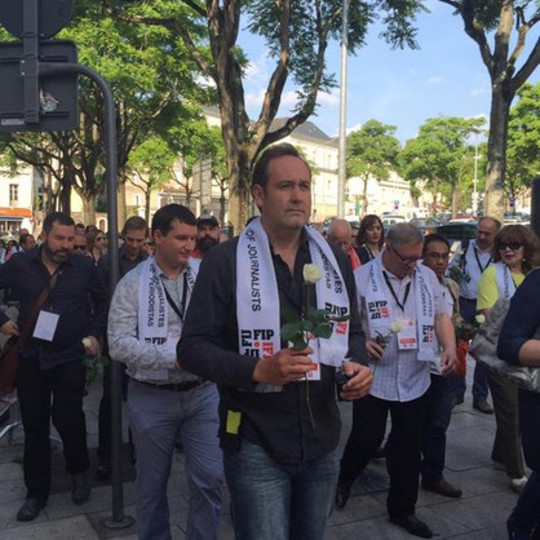- Since the Taliban power takeover, how has the CWA Canada supported Afghan media workers at risk who needed to flee the country? How many journalists did you help to relocate until the date?
In the midst of the Taliban takeover of Kabul in August, I began receiving random emails from Afghan journalists begging for help to escape the country. As the leader of a media union, and as a human being, I felt I had to do all I could to help. I quickly found out that other groups and individual journalists were receiving similar pleas and that Journalists for Human Rights (JHR) was co-ordinating the rescue effort in Canada. I quickly joined the JHR coalition (which is also working with IFJ) and have been working daily on the effort. That work has involved:
- Daily communication with Afghan journalists or fixer.
- Constantly advocating on behalf of Afghan journalists for visas.
- Providing money to Afghans in need, both directly from JHR and monthly funding by CWA Canada to two media unions in Afghanistan.
- Helping arrange visas to Pakistan and other countries and even Afghan passports for at-risk Afghan journalists, and transportation out of Afghanistan.
So far, JHR has moved 189 Afghan journalists and family members out of the country, including 128 to Canada and 61 to Pakistan or other countries. Hundreds more remain stuck in Afghanistan.
- What were the main challenges you faced when working to relocate Afghan journalists? Were national and international authorities and bureaucracy helpful?
The biggest challenge has always been the difficulty getting visas. Canada and other countries are very slow in approving visas. We still have 61 people in limbo in Pakistan because they can’t get visas to Canada or other countries and this means we have been unable to move more people to Pakistan because the cost of supporting those already there is much higher than expected. The government process has been frustratingly slow, inefficient, and uncommunicative. And to be frank, it has put lives at risk. Many who applied to Canada as far back as August have still heard nothing and have not received a file/case number. Every day they are in Afghanistan leaves them in grave danger. The political/bureaucratic process has been a tremendous disappointment and needs to be improved and streamlined urgently.
- How’s the life of Afghan journalists once they were relocated to Canada? How are you helping them to continue with their personal and professional lives?
Life will be a challenge for most who arrive in Canada, especially those who don’t speak English. The government provides modest funding for a year, but costs are high in Canada, especially for rent. And finding good jobs can be difficult, especially in the media. We are doing what we can to help, including providing furniture and clothing and financial support when necessary. There are also support organizations, including a vibrant Afghan group in Toronto.
- What has been the most successful story of solidarity with Afghan journalists you can share with us?
Our first big success story to date was getting Raihan Tamanna and her two young children to Canada. She was very lucky that the government approved a visa for her – many others who applied at the same time have heard nothing. Here is a link to Raihan’s story: https://www.cwa-scacanada.ca/EN/CWeh/2021/21.10_afghan.shtml
- Any further comments you would like to make
The Afghan project has become an important part of my job. I communicate with Afghan journalists daily and the JHR coalition has a group call each week in which we compare notes, provide updates, and discuss options in the face of changing government requirements, lack of communication from officials, and painfully slow processing of visa applications.
Everyone must understand the desperate situation many of our colleagues are having to endure. The hardest thing is having to reply to emails daily saying there is nothing we can do to help because we already have hundreds on our list. The pleas are heart-rending. How do you reply to a message like this when you know you can do nothing to help urgently: “Please time is over it is the final chance please do something for us to enter please please please please please."
The big thing here for me is the human aspect. These are people, just like us, who have had their world destroyed. They have lost their jobs as journalists, and they must give up everything they have and flee with just the clothes on their backs to save their lives and live a decent life. Imagine if it was you, or one of your family members. You would do everything you could to help. We’re all sisters and brothers and I feel an overpowering obligation as human being to help. And I, like many of my colleagues, won’t stop trying until everyone of them is safe.

